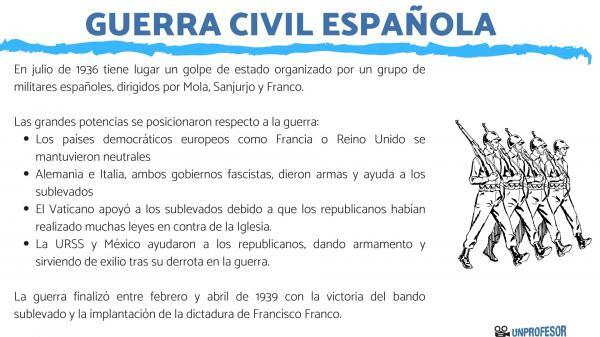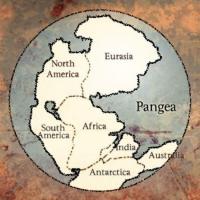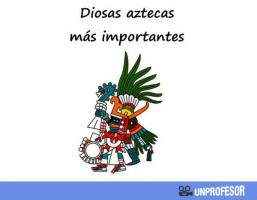The spanish civil war

Possibly the most important war conflict of the history of Spain is the Spanish Civil War, being a war in which many of the tensions that had been going on for years in the Hispanic country and that caused a war that even today has consequences. To learn about the great Spanish event of the 20th century in this lesson from a Teacher we offer you a complete summary of the Spanish Civil War.
The Spanish Civil War began on July 17, 1936 after a failed coup attempt and a military invasion by a rebellious side that wanted to overthrow the government of the Second republic. To understand the reasons why all this happened, we must talk about the main antecedents and causes that led to a war that destroyed Spain in every possible way.
The causes of the Spanish Civil War They are very numerous, arising both within the country and internationally, and causing it to be one of the wars with the greatest analysis. The main causes and antecedents of the Spanish Civil War are the following:
- Spain's economy was very backward with respect to the rest of European nations, still subsisting thanks to the primary sector and having a very weak industry. Spain's economy had been greatly weakened by the Great Depression in the United States, but the leaders of the rebels blamed all this on the government of the Republic.
- Great social differences, since the landowners owned most of the wealth and the workers of the field and laborers suffered great food crises. There was no middle class to mediate, so the upper classes leaned on the right and the lower class on the left, causing a huge ideological clash.
- The Church was upset with the Republic, since it was a clearly anti-religious government, causing them to support the ideas of those who wanted to overthrow the government in any case.
- Spanish politics was in crisis, since in a few years totally different governments had passed, causing the management to be in chaos and the country to undergo enormous totally different changes every few years. In this situation of instability, the population looked for a change towards extremism, emerging the Falange to fill this void.
- Spain had become a violent country, with several coups, numerous rebellions, assassinations, death threats in Congress, almost everyone carried weapons of fire, and the great extremist parties argued that if it could not be achieved with democracy, it would be achieved with violence.
- Outside influence was key to the war, since the fascism that arose in Germany and Italy influenced the rebellious side, serving as an example of how to take a country by force and being the Germans who gave the most equipment and weapons to the revolted.
We begin with the summary of the Spanish Civil War and how the conflict arose and evolved. In July 1936 a coup organized by a group of Spanish soldiers, Directed by Mola, Sanjurjo and Franco. The coup was initiated in Morocco on July 17, still belonging to Spain and where an important part of Spanish troops was located. The next day, the uprising took place in much of Spain, and in a few days the rebels had a third of the territory.
Shortly after the war began, the great powers positioned themselves Regarding the war:
- European democratic countries like France or the United Kingdom remained neutral, being against both the fascism of the rebels and the socialist ideas of the republicans.
- Germany and Italy, both fascist governments gave weapons and help the rebels, being its main benefactors.
- The Vatican supported the rebels because the Republicans had made many laws against the Church.
- The USSR and Mexico helped the Republicans, giving weapons and serving as exile after his defeat in the war.
At the beginning of the war, Franco's troops crossed from the strait to Andalusia, starting there on their way to Madrid to take the capital and the country. On the way to the town, the army stopped in Toledo attacking the city to liberalize the Alcazar that was in the hands of the Republicans.
On the other hand, in the north of Spain the leader Mola occupies Navarra and a large part of the Basque Country, from where his intention is to go to Madrid and join troops with Franco to carry out a final attack. The Republicans feared that the capital would be taken, so they changed their capital to Valencia, being a city much further away from the rebellious troops. Even so, the rebels lose the battles near Madrid and fail to take the city, so Franco decides to go north to continue with the conquest of cities.
After taking the few free zones of the Basque Country, bombarding cities like Guernica, the rebels continue to take northern areas, occupying Cantabria and Asturias and causing that in November 1937 the entire north of Spain was already in the hands of the rebels.
After the end of the war in the North, the main clashes went to the East, where the Republicans achieved an important victory in Teruel, but shortly after the Aragonese city was recovered by the rebels. In their advance to the East, the rebels took the Castellón city of Vinaroz, causing the Republicans to initiate an offensive known as the Battle of the Ebro which lasted from July 1938 to November 1938 and involved the most important battle of the whole war. The victory was for the rebels, being a key victory for the future of the war.
The end of the Spanish civil war
After learning that the President of the Republic had escaped to Catalonia, Franco decided to conquer the Catalan territory, first through Tarragona and then Barcelona, causing the Republican president to flee Spain. Like the president, many Spaniards fled the region, afraid of being assassinated for having supported the Republic when they saw that Franco's victory was imminent.
The war ended between February and April 1939 with the victory of the rebel side and the implementation of the dictatorship of Francisco Franco, changing the history of Spain forever.
To finish this complete summary of the Spanish Civil War, we must list the consequences that this war brought to Spanish history. It was a very important conflict that affected many aspects of Spanish society.
We can say that the reason why the Spanish Civil War is the most relevant war is not because of the number of deaths or because of its ideological importance, but rather because of the huge amount of consequences it brought to the Spanish nation, affecting subsequent decades.
Demographic consequences
It is thought that between the war and the postwar period they could die half a million people, being therefore one of the most tragic times in Spanish history. In these numbers of deaths we can find all those who died during the armed confrontation, those people who were shot after the war to support the Republican side, and the hunger and pandemics caused during the war by the confrontation and after it by the policies of austerity.
To all these deaths we must add the lack of birth because it is a very complicated time to have children, and also the exile of about 400,000 people who fled the Spanish nation for fear of reprisals and of which many did not return and became Spanish groups in other countries.
Economic consequences
The war and post-war were an economic disaster, causing a decline in the economy of the nation and of the Spanish who would not recover until the 1950s, and that she would never again be that of one of the great European countries.
Among the main factors of the economic crisis we must speak of the destruction of most of the industry that caused Spain would once again be an agrarian country, destruction of thousands of buildings by the bombings, increased debt for the money given by the Republicans to the USSR and for the interest paid by the rebels after their victory. To this was added that with the start of World War II the countries barely traded due to their lack of money, so Spain did not have a strong market to recover from.
Social consequences
The workers lost all their rights obtained during the government of the Republic, becoming a lower class that depended on the economic strength of a few. The economic and social power returned to the hands of the nobility, the industrial and agrarian oligarchy, and the clergy, causing enormous inequality and ending the attempts at republican rapprochement.
The Spanish also lost many freedoms and rights, assuming a repression in which freedom of speech was very limited, and censorship was the usual.
Other consequences of the Spanish Civil War
The war was so huge that it had many more consequences than those mentioned above, among them we can talk about its consequences at the international level, since Spain moved away from the international scene for some years although helping nations like Germany in their fascist wars.
Another consequence was the cultural descent, partly because the Franco government was against much of the culture, but also because of death important figures of art during the war, thereby causing a huge setback in the cultural question. The situation of the woman during the Franco regime It was also alarming: of all the achievements obtained during the Republic, now, the role of women was once again at home and with the family.



